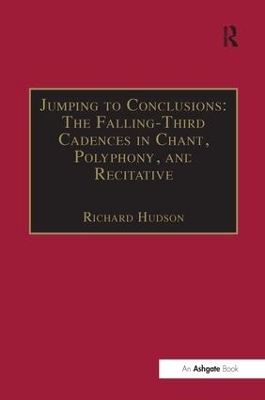
Jumping to Conclusions: The Falling-Third Cadences in Chant, Polyphony, and Recitative
Seiten
2005
Routledge (Verlag)
978-0-7546-5407-0 (ISBN)
Routledge (Verlag)
978-0-7546-5407-0 (ISBN)
Concerns the cadences, which reach their conclusion by jumping from scale degree 3 down to 1 or to 1-7-1. This book suggests some solutions and concludes with a brief history of the 4-3-1 figure. It includes many musical examples by composers such as Dunstable, Dufay, Josquin, Palestrina, A Scarlatti, Handel, Mozart, Schubert, and Rossini.
This book concerns the cadences which reach their conclusion by jumping from scale degree 3 down to 1 or to 1-7-1. The chronological history commences in Gregorian Chant, where the falling third is often preceded by scale degree 4, forming the striking figure 4-3-1. The cadences move, along with the borrowed chant melodies, into the polyphony of the late 14th, 15th and 16th centuries. Here, melodic figures with the shape of 4-3-1, but on any scale degree, become a significant element of style. At cadence the unbroken melodic progression 4-3-1-7-1 may lie entirely in the upper voice, or 4-3-1 may occur in a lower voice followed by 7-1 in the upper. The general effect of the falling third changes as the surrounding musical elements change and as polyphony itself evolves through time. The cadences are reborn in recitative, first in an unbroken form with 4-3-1-7-1 in the voice, later in a broken form with 4-3-1 in the voice, 7-1 in the instrumental continuo part. Many evolving rhythmic, harmonic, melodic, and other elements are important in the cadences, but two are especially significant, for they lead to difficult problems for later performers. These concern (1) the structure in which the accompaniment's V chord is notated directly below the voice's first or single scale degree 1, and (2) the possibility of an appoggiatura on scale degree 2 between the two notes of the falling third. The book suggests some new and unexpected solutions to both these problems and concludes with a brief history of the 4-3-1 figure. The book includes many musical examples by composers such as Dunstable, Dufay, Josquin, Palestrina, A. Scarlatti, J.S. Bach, Handel, Telemann, Haydn, Mozart, Schubert, Mendelssohn and Rossini.
This book concerns the cadences which reach their conclusion by jumping from scale degree 3 down to 1 or to 1-7-1. The chronological history commences in Gregorian Chant, where the falling third is often preceded by scale degree 4, forming the striking figure 4-3-1. The cadences move, along with the borrowed chant melodies, into the polyphony of the late 14th, 15th and 16th centuries. Here, melodic figures with the shape of 4-3-1, but on any scale degree, become a significant element of style. At cadence the unbroken melodic progression 4-3-1-7-1 may lie entirely in the upper voice, or 4-3-1 may occur in a lower voice followed by 7-1 in the upper. The general effect of the falling third changes as the surrounding musical elements change and as polyphony itself evolves through time. The cadences are reborn in recitative, first in an unbroken form with 4-3-1-7-1 in the voice, later in a broken form with 4-3-1 in the voice, 7-1 in the instrumental continuo part. Many evolving rhythmic, harmonic, melodic, and other elements are important in the cadences, but two are especially significant, for they lead to difficult problems for later performers. These concern (1) the structure in which the accompaniment's V chord is notated directly below the voice's first or single scale degree 1, and (2) the possibility of an appoggiatura on scale degree 2 between the two notes of the falling third. The book suggests some new and unexpected solutions to both these problems and concludes with a brief history of the 4-3-1 figure. The book includes many musical examples by composers such as Dunstable, Dufay, Josquin, Palestrina, A. Scarlatti, J.S. Bach, Handel, Telemann, Haydn, Mozart, Schubert, Mendelssohn and Rossini.
Richard Hudson is Emeritus Professor of Musicology at the University of California, Los Angeles, USA.
Contents: Preface; Introduction. Part I The Falling-Third Cadences in Chant and Polyphony: Gregorian chant; Late 14th- and early 15th-century polyphony; Polyphony from Dufay to Palestrina. Part II The Falling-Third Cadences in Recitative: Monody and recitative in the 17th century; Later recitative; The Appoggiatura. The Conclusions: The 4-3-1 figure in history. Bibliography; Index.
| Erscheint lt. Verlag | 28.12.2005 |
|---|---|
| Verlagsort | London |
| Sprache | englisch |
| Maße | 152 x 229 mm |
| Gewicht | 476 g |
| Themenwelt | Kunst / Musik / Theater ► Musik ► Klassik / Oper / Musical |
| Kunst / Musik / Theater ► Musik ► Musiktheorie / Musiklehre | |
| ISBN-10 | 0-7546-5407-9 / 0754654079 |
| ISBN-13 | 978-0-7546-5407-0 / 9780754654070 |
| Zustand | Neuware |
| Haben Sie eine Frage zum Produkt? |
Mehr entdecken
aus dem Bereich
aus dem Bereich
klassische Musik für jeden Tag
Buch | Hardcover (2023)
Diogenes (Verlag)
29,00 €
Mozart und der Abschied von der Aufklärung
Buch | Hardcover (2024)
C.H.Beck (Verlag)
28,00 €


